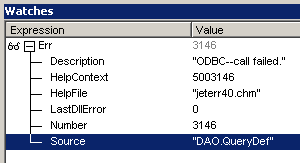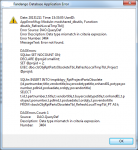I have long noticed / been annoyed with the lack of detailed error information made available to VBA running a given DAO.QueryDef object whereas running the same QueryDef interactively has more error information. (At least this time all of Access is not crashing when executing the QueryDef via VBA code... sometimes that has been the difference!) Example:
Via Access GUI:

Via VBA I see a mere:

Is there some way to capture in VBA code the rest of the error message? In this specific example, the error coming back from SQL Server.
Via Access GUI:
Via VBA I see a mere:
Is there some way to capture in VBA code the rest of the error message? In this specific example, the error coming back from SQL Server.





